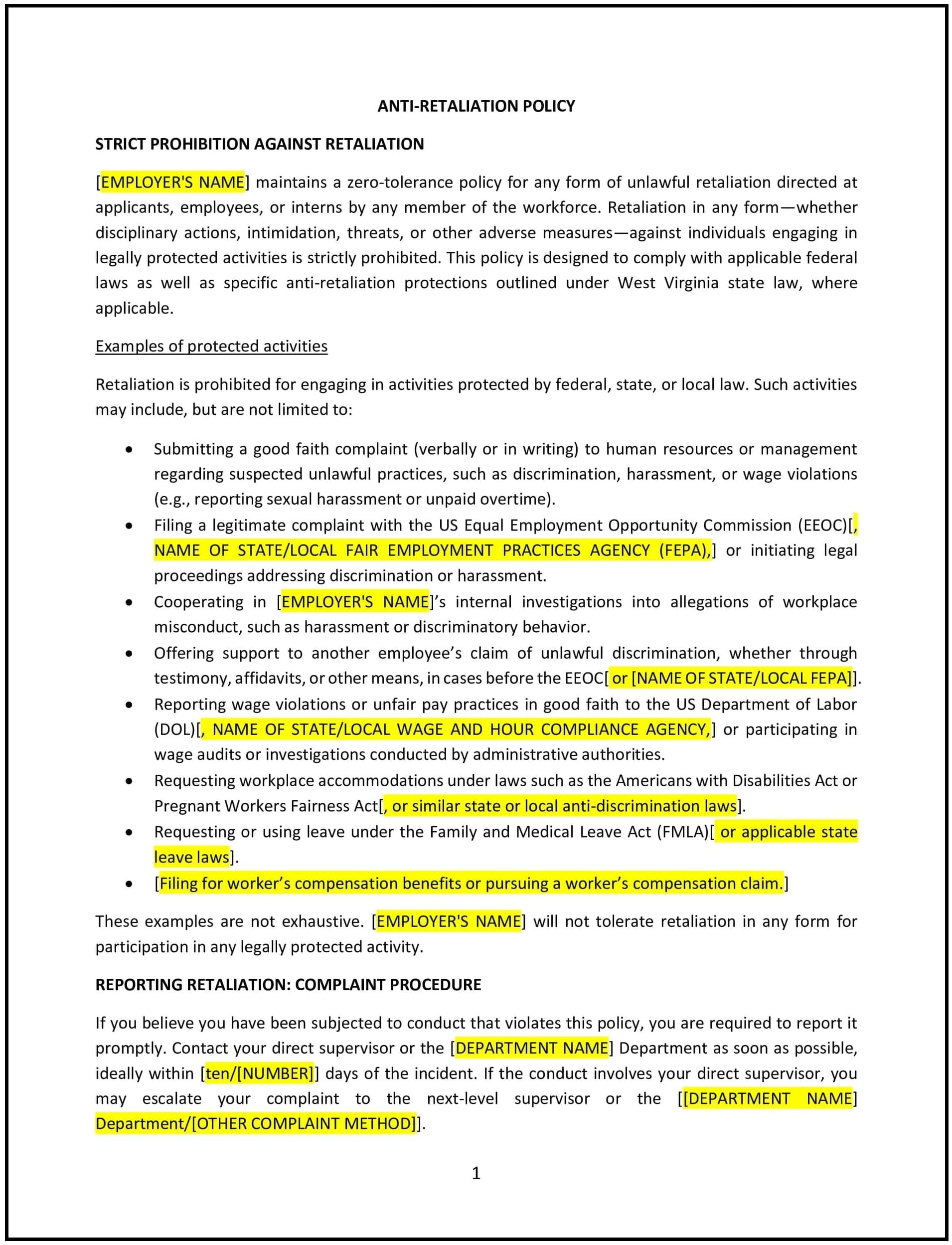Anti-retaliation policy (West Virginia): Free template
Got contracts to review? While you're here for policies, let Cobrief make contract review effortless—start your free review now.

Customize this template for free
An anti-retaliation policy helps West Virginia businesses ensure that employees who report misconduct, such as harassment, discrimination, or violations of company policy, are protected from retaliation. This policy outlines how the company will handle complaints of retaliation, ensuring that employees are not punished or treated unfairly for engaging in protected activities.
By implementing this policy, businesses can foster a culture of transparency, trust, and accountability while reducing the risk of legal claims and improving employee morale.
How to use this anti-retaliation policy (West Virginia)
- Define retaliation: Clearly define retaliation, including any adverse actions taken against an employee for reporting misconduct, participating in investigations, or exercising their legal rights (e.g., termination, demotion, harassment, denial of benefits).
- Set protection measures: Outline how employees will be protected from retaliation, ensuring that they are not penalized for engaging in protected activities such as filing a complaint, cooperating in an investigation, or participating in legal proceedings.
- Establish reporting procedures: Provide employees with a clear and confidential process for reporting retaliation, including who they should contact (HR, management, or an external hotline) and how retaliation complaints will be handled.
- Investigate retaliation claims: Ensure that any claims of retaliation are thoroughly investigated in a timely manner and that corrective actions are taken if retaliation is found.
- Provide remedies: Specify the actions that will be taken if retaliation is proven, such as reinstating the employee to their previous position, offering compensation, or implementing disciplinary measures against the individual responsible for the retaliation.
- Ensure confidentiality: Stress that retaliation complaints will be kept confidential to the extent possible and that employees will be protected from further harm or retaliation during the investigation process.
- Promote a culture of accountability: Encourage employees to report misconduct and retaliation without fear, and make it clear that retaliation itself is not tolerated.
Benefits of using this anti-retaliation policy (West Virginia)
This policy offers several benefits for West Virginia businesses:
- Promotes legal compliance: Helps businesses comply with both federal and state laws that protect employees from retaliation, such as the Civil Rights Act, the Family and Medical Leave Act (FMLA), and the West Virginia Human Rights Act.
- Protects employees: Safeguards employees who speak up against wrongdoing by ensuring they are not subject to retaliation or adverse treatment.
- Enhances transparency: Fosters a transparent, accountable workplace where employees can report concerns without fear of reprisal.
- Reduces legal risks: By actively preventing retaliation, businesses reduce the likelihood of costly legal disputes and discrimination claims.
- Improves employee morale: Employees are more likely to trust the company and feel supported in reporting misconduct when they know they are protected from retaliation.
Tips for using this anti-retaliation policy (West Virginia)
- Communicate the policy clearly: Ensure that all employees understand that retaliation is prohibited and that they have a safe and confidential way to report any concerns.
- Provide multiple reporting channels: Offer employees several reporting options, such as HR, management, or external third-party services, to encourage reporting of retaliation.
- Investigate promptly: Ensure that all retaliation complaints are investigated in a timely manner, and that corrective actions are taken quickly when necessary.
- Educate managers: Train managers and supervisors to recognize signs of retaliation and to take appropriate actions to prevent it from occurring in the workplace.
- Review and update regularly: Regularly review and update the policy to ensure it reflects any changes in West Virginia laws, federal regulations, or company practices.